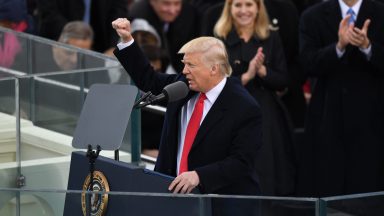
Donald Trump has officially emerged as the 47th President of the United States, marking a significant moment in American political history.
In a remarkable victory, the Republican president-elect triumphed over Vice President Kamala Harris in the highly contested 2024 presidential election, securing both the popular vote and the crucial electoral vote. Following this historic win, he addressed his supporters on Wednesday morning, expressing his commitment to ushering in a ?golden age of America? and declaring the launch of what he termed ?the greatest political movement of all time.? This rhetoric resonates deeply with his base, emphasizing a return to traditional values and renewed national pride.
Before Trump?s recent triumph, Grover Cleveland held the unique distinction of being the only president to serve non-consecutive terms. The question arises: does this unusual situation grant Trump the opportunity to run for a third term in the future? Understanding the intricacies of presidential terms is vital to grasping the full implications of his presidency and the potential for future elections.
Exploring Trump’s Eligibility for a Potential 2028 Run
The stipulations set forth in the 22nd Amendment of the U.S. Constitution clearly limit any president to two elected terms in office, including instances of non-consecutive service. Consequently, the next four years will represent Trump’s final opportunity to occupy the nation?s highest office. This constitutional limitation has sparked considerable debate regarding the implications of presidential power and the potential for future candidates to rise within the Republican Party.
As noted by the Ronald Reagan Presidential Library and Museum, George Washington, the inaugural U.S. president, established the precedent for presidential term limits by voluntarily stepping down after two terms. This customary practice was adhered to by all succeeding presidents until Franklin D. Roosevelt, who famously broke this tradition by being elected for four consecutive terms from 1932 to 1944. Roosevelt’s unprecedented tenure raised critical questions about the balance of power in the executive branch.
In the wake of Roosevelt’s extended presidency, a proposal emerged in 1947 to limit presidents to two elected terms, which was introduced in the U.S. House of Representatives shortly after his passing. Following thorough discussions and revisions in the Senate, this pivotal amendment was ultimately ratified by the states on February 27, 1951. This legislative move was designed to safeguard against the potential for any future president to consolidate excessive power through prolonged tenure.
Analyzing Trump’s Remarks on Future Terms and Political Ambitions
Trump has consistently made various comments regarding the concept of term limits and his aspirations during his time in office, yet the sincerity of his statements often remains ambiguous. During a conservative Christian event in July, he suggested that if he were elected again in 2024, voters might not need to cast ballots in the future. This statement raised eyebrows and prompted discussions about the implications of his leadership style and governance philosophy.
At the Believers? Summit, an event organized by the conservative advocacy group Turning Point Action, Trump encouraged Christian attendees to vote, stating, ?Christians, get out and vote. Just this time.? He continued, ?You won?t have to do it anymore. Four more years. You know what? It?ll be fixed. It?ll be fine. You won?t have to vote anymore, my beautiful Christians.? Such declarations have sparked debate about the potential erosion of democratic processes under his administration.
With Republicans vying for control of both the House and Senate, concerns surrounding Trump?s potential to overstep constitutional boundaries?echoing his actions during the January 6 Capitol insurrection?are increasingly prevalent. Political analysts and observers are keenly watching how his leadership might evolve in this new term, particularly in light of his past controversies and the implications for American democracy.
Prior to Election Day, the 78-year-old Trump indicated that he would not pursue a run for the presidency again in 2028 should he lose the 2024 election. In a candid interview with Sinclair Media Group, he was asked about the possibility of another campaign if he were to be defeated by Harris. He replied, ?No, I don?t. I think? that will be it,? expressing a firm stance on his political future while simultaneously conveying optimism for success in the upcoming election.
Key Dates: When Will Trump Officially Begin His Second Term?
Donald Trump is set to commence his second term in office on Inauguration Day, which will take place on Monday, January 20, 2025. This date marks a significant moment in American history as the nation prepares for a continuation of Trump?s policies and governance style, which have sparked both fervent support and intense opposition across the political spectrum.






